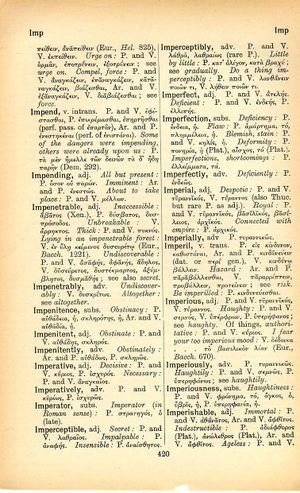imperious: Difference between revisions
From LSJ
Οὐδείς, ὃ νοεῖς μὲν, οἶδεν, ὃ δέ ποιεῖς, βλέπει → Quid cogites, scit nemo; quid facias, patet → nicht weiß man, was du denkst, doch sieht man, was du tust
(Woodhouse 3) |
(CSV4) |
||
| Line 1: | Line 1: | ||
{{ | {{Woodhouse1 | ||
| | |Text=[[File:woodhouse_420.jpg|thumb|link={{filepath:woodhouse_420.jpg}}]]'''adj.''' | ||
P. and V. [[τυραννικός]], V. [[τύραννος]]. | |||
<b class="b2">Haughly</b>: P. and V. [[σεμνός]], V. [[ὑπέρφρων]], P. [[ὑπερήφανος]]; see [[haughty]]. | |||
<b class="b2">Of things, authoritative</b>: P. and V. [[κύριος]]. | |||
<b class="b2">I fear your too imperious mood</b>: V. δέδοικα . . . τὸ βασιλικὸν [[λίαν]] (Eur., <b class="b2">Bacch.</b> 670). | |||
}} | }} | ||
Revision as of 09:43, 21 July 2017
English > Greek (Woodhouse)
adj.
P. and V. τυραννικός, V. τύραννος. Haughly: P. and V. σεμνός, V. ὑπέρφρων, P. ὑπερήφανος; see haughty. Of things, authoritative: P. and V. κύριος. I fear your too imperious mood: V. δέδοικα . . . τὸ βασιλικὸν λίαν (Eur., Bacch. 670).

